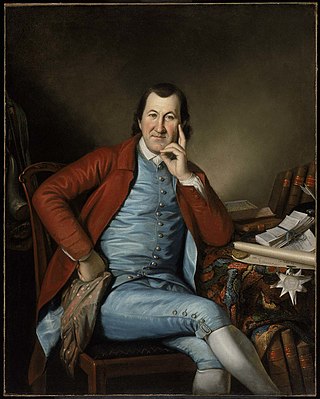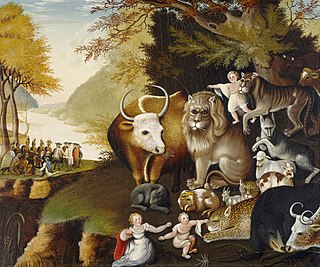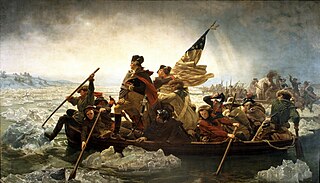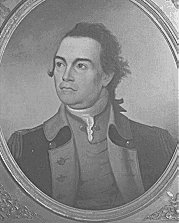
George Keith was a Scottish religious leader, a Presbyterian turned Quaker turned Anglican. He was born in Peterhead, Aberdeenshire, Scotland, to a Presbyterian family and received an M.A. from the University of Aberdeen. Keith joined the Religious Society of Friends (Quakers) in the 1660s, accompanying George Fox, William Penn, and Robert Barclay on a mission to the Netherlands and Germany in 1677.

The Middle Colonies were a subset of the Thirteen Colonies in British America, located between the New England Colonies and the Southern Colonies. Along with the Chesapeake Colonies, this area now roughly makes up the Mid-Atlantic states.

The Province of Pennsylvania, also known as the Pennsylvania Colony, was a British North American colony founded by William Penn, who received the land through a grant from Charles II of England in 1681. The name Pennsylvania was derived from "Penn's Woods", referring to William's father Admiral Sir William Penn.

John Dickinson, a Founding Father of the United States, was an attorney and politician from Philadelphia, Pennsylvania, and Wilmington, Delaware. Dickinson was known as the "Penman of the Revolution" for his twelve Letters from a Farmer in Pennsylvania, published individually in 1767 and 1768, and he also wrote "The Liberty Song" in 1768.

The Yearly Meeting of the Religious Society of Friends (Quakers) in Britain, also known as the Britain Yearly Meeting, is a Yearly Meeting of the Religious Society of Friends (Quakers) in England, Scotland, Wales, the Channel Islands and the Isle of Man. It is the national organisation of Quakers living in Britain. Britain Yearly Meeting refers to both the religious gathering and the organisation. "Yearly Meeting", or "Yearly Meeting Gathering" are usually the names given to the annual gathering of British Quakers. Quakers in Britain is the name the organisation is commonly known by.

Timothy Matlack was an American politician, military officer and businessman. A brewer and beer bottler who emerged as a popular and powerful leader in the American Revolutionary War, Matlack served as Secretary of Pennsylvania during the conflict and was a delegate to the Second Continental Congress in 1780. Matlack was known for his excellent penmanship, and in 1776 was chosen to inscribe the original United States Declaration of Independence on vellum.

The testimony of peace is the action generally taken by members of the Religious Society of Friends (Quakers) for peace and against participation in war. Like other Quaker testimonies, it is not a "belief", but a description of committed actions, in this case to promote peace, and refrain from and actively oppose participation in war. Quakers' original refusal to bear arms has been broadened to embrace protests and demonstrations in opposition to government policies of war and confrontations with others who bear arms, whatever the reason, in the support of peace and active nonviolence. Due to this core testimony, the Religious Society of Friends is considered one of the traditional peace churches.
The Religious Society of Friends began as a proto-evangelical Christian movement in England in the mid-17th century in Lancashire. Members are informally known as Quakers, as they were said "to tremble in the way of the Lord". The movement in its early days faced strong opposition and persecution, but it continued to expand across the British Isles and then in the Americas and Africa.
Yearly Meeting is a term used by members of the Religious Society of Friends, or Quakers, to refer to an organization composed of constituent meetings or churches within a geographical area. The constituent meetings are called Monthly Meetings in most of the world; in England, local congregations are now called Area Meetings, in Australia Monthly Meetings are called Regional Meetings. "Monthly" and "Yearly" refer to how often the body meets to make decisions. Monthly Meetings may be local congregations that hold regular Meetings for Worship, or may comprise a number of Worship Groups. Depending on the Yearly Meeting organization, there may also be Quarterly Meetings, Half-Yearly Meetings, or Regional Meetings, where a number of local Monthly Meetings come together within a Yearly Meeting.

Pennsylvania was the site of many key events associated with the American Revolution and American Revolutionary War. The city of Philadelphia, then capital of the Thirteen Colonies and the largest city in the colonies, was a gathering place for the Founding Fathers who discussed, debated, developed, and ultimately implemented many of the acts, including signing the Declaration of Independence, that inspired and launched the revolution and the quest for independence from the British Empire.

Quakers are people who belong to a historically Protestant Christian set of denominations known as the Religious Society of Friends. Members of these movements are generally united by a belief in each human's ability to experience the light within or see "that of God in every one". Some profess a priesthood of all believers inspired by the First Epistle of Peter. They include those with evangelical, holiness, liberal, and traditional Quaker understandings of Christianity. There are also Nontheist Quakers, whose spiritual practice does not rely on the existence of God. To differing extents, the Friends avoid creeds and hierarchical structures. In 2017, there were an estimated 377,557 adult Quakers, 49% of them in Africa.

Benjamin Lay was an Anglo-American Quaker humanitarian and abolitionist. He is best known for his early and strident anti-slavery activities which would culminate in dramatic protests. He was also an author, farmer, vegetarian, and distinguished by his early concern for the ethical treatment of animals.
The Quaker movement began in England in the Seventeenth Century. Small Quaker groups were planted in various places across Europe during this early period. Quakers in Europe outside Britain and Ireland are not now very numerous although new groups have started in the former Soviet Union and satellite countries. By far the largest national grouping of Quakers in Europe is in Britain.
Quakers are members of a Christian religious movement that started in England as a form of Protestantism in the 17th century, and has spread throughout North America, Central America, Africa, and Australia. Some Quakers originally came to North America to spread their beliefs to the British colonists there, while others came to escape the persecution they experienced in Europe. The first known Quakers in North America arrived in the Massachusetts Bay Colony in 1656 via Barbados, and were soon joined by other Quaker preachers who converted many colonists to Quakerism. Many Quakers settled in the Colony of Rhode Island and Providence Plantations, due to its policy of religious freedom, as well as the British colony of Pennsylvania which was formed by William Penn in 1681 as a haven for persecuted Quakers.

The "Holy Experiment" was an attempt by the Religious Society of Friends, also known as Quakers, to establish a community for themselves and other persecuted religious minorities in what would become the modern state of Pennsylvania. They hoped it would show to the world how well they could function on their own without any persecution or dissension.
A Book of Discipline may refer to one of the various books issued by a Yearly Meeting of the Religious Society of Friends, setting out what it means to be a Quaker in that Yearly Meeting. The common name for this book varies from one Yearly Meeting to another and includes Book of Discipline, Faith and Practice, Christian Faith and Practice, Quaker Faith and Practice, Church Government and Handbook of Practice and Procedure. Each Book of Discipline is updated periodically by each Yearly Meeting according to the usual practice of decision making within the Religious Society of Friends.

William Penn was an English writer and religious thinker belonging to the Religious Society of Friends (Quakers), and founder of the Province of Pennsylvania, a North American colony of England. He was an early advocate of democracy and religious freedom, notable for his good relations and successful treaties with the Lenape Native Americans.

The 1688 Germantown Quaker Petition Against Slavery was the first protest against enslavement of Africans made by a religious body in the Thirteen Colonies. Francis Daniel Pastorius authored the petition; he and three other Quakers living in Germantown, Pennsylvania, signed it on behalf of the Germantown Meeting of the Religious Society of Friends. Clearly a highly controversial document, Friends forwarded it up the hierarchical chain of their administrative structure—monthly, quarterly, and yearly meetings—without either approving or rejecting it. The petition effectively disappeared for 150 years into Philadelphia Yearly Meeting's capacious archives; but upon rediscovery in 1844 by Philadelphia antiquarian Nathan Kite, latter-day abolitionists published it in 1844 in The Friend, in support of their antislavery agitation.
Joseph Moore, was notable as a Quaker peace negotiator sent to the talks between Native leaders of the Western Confederacy and American government representatives at Sandusky, Ohio, in 1793. The issue was whether or not American settlers would be allowed to settle west of the Ohio River.
The American Friends Service Committee (AFSC) is a Religious Society of Friends (Quaker) founded organization working for peace and social justice in the United States and around the world. AFSC was founded in 1917 as a combined effort by American members of the Religious Society of Friends to assist civilian victims of World War I. It continued to engage in relief action in Europe and the Soviet Union after the Armistice of 1918. By the mid-1920s it focused on improving racial relations in the U.S., as well as exploring ways to prevent the outbreak of another conflict before and after World War II. As the Cold War developed, it moved to employ more professionals rather than Quaker volunteers, over time attempting to broaden its appeal and respond more forcefully to racial injustice, women's issues, and demands of sexual minorities for equal treatment. They also work for world peace.














